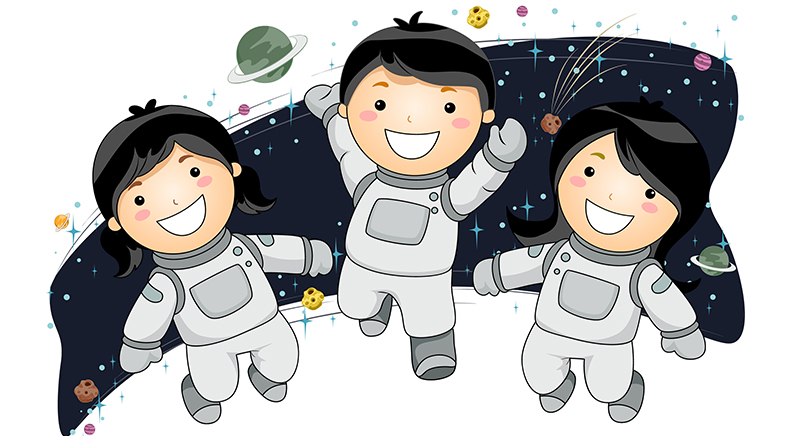Reach for the stars
-
- from Shaastra :: vol 01 issue 05 :: Sep - Oct 2022

Space is an excellent platform for STEM education. It fascinates students, can be observed all around, and can readily be connected to real-world applications.
Edwin Hubble had put it well. "Equipped with his five senses, man explores the universe around him and calls the adventure Science," the American astronomer had famously said. Indeed, for centuries, humans have sought answers to the mysteries of the universe, asking questions that are still to be resolved. When did the universe begin, are we the only intelligent life known, what are the celestial objects we see?
Astronomy is one of the most exciting and rapidly evolving branches of science. By studying it, we can understand how the universe works under conditions that are impossible to recreate on Earth. Astronomy and space could be of utmost importance in education to foster an interest in STEM (Science, Technology, Engineering, and Mathematics) in an exciting and experiential way.
While STEM subjects are of great interest in India, the focus is still on engineering and medicine, which offer lucrative jobs. Students mostly select pure sciences as a fallback. The focus in schools is on rote learning with little emphasis on project-based learning. There is still a gender disparity, with few women at the higher levels of STEM careers. Despite having universities and national labs of repute, the country has not achieved significant recognition in terms of innovations, inventions and international peer recognition.
THE ROOM AND THE WORLD
As former President Ram Nath Kovind once said, "Without a strong, dynamic, and creative education and schooling system, we cannot create a research and innovation culture." How do we achieve this? Astronomy may be the route to take.
STEM is an innovative educational method that combines the teaching of these subjects into an interdisciplinary, hands-on format in a real-world context, making connections between the classroom and the world. STEM encourages critical thinking and problem-solving, and additionally taps a student's creative side by incorporating the arts. STEM careers are projected to be the careers of the future as our world becomes more technology-based, and as changing world conditions require alternative solutions.
Space and astronomy are excellent platforms for STEM education. The subjects fascinate students, can be observed all around in nature and can be readily connected to real-world applications. Astronomy lends itself to the outdoors and collaborative activities, leads to connections with all STEM subjects and is truly interdisciplinary.
Astronomy is called the 'Mother of all sciences'. Astrophysics is a field that employs the principles of physics and chemistry in the study of astronomical phenomena. We already know that physics is the backbone of astronomy – helping us learn about orbits and laws of motion, as well as about telescopes that teach optics, and spectroscopy to determine the composition of faraway objects. Chemistry can be taught through the analysis of meteors and asteroids or studying the composition of planets.
Astrobiology, a relatively new field, studies the origin and possibility of life in the universe. Students fear math, but if you connect differential equations to the trajectory of a rocket, they will certainly enjoy it more.
Recent technological achievements that are spinoffs from space technology include wireless internet, GPS and medical imaging.
Space also leads to understanding engineering and technology and how systems are iteratively improved to target higher sensitivity, such as the James Webb telescope, or loftier objectives such as better Launch Vehicles. Through remote sensing and the functionality of satellites, students learn about geography, earth sciences and climate, all essential fields in today's world.
I have been taking young students on astronomy trips, and find that they greatly enjoy viewing the wonders of the night sky and sky photography along with imaging techniques that make these truly Instagram-worthy! Extend this to computing and data analysis, especially relevant in space sciences due to the massive amounts of satellite data.
SPACE TO LEARN
Space education can be truly investigative, hands-on and interdisciplinary. A project such as designing a space habitat, for instance, will entail learning about planetary conditions, the technology to design the modules, how to provide food, oxygen and protection and even the psychology of how astronauts would combat solitude.
There are those who feel that space exploration is too 'out of the world' and that allocating funds to this is a waste. However, research on space technology has had a direct impact on modern technology. Recent technological achievements that are spinoffs from space technology include wireless internet, GPS and medical imaging.
Recognising the importance of space education, the government recently encouraged a 'space' module in the Atal Tinkering Labs. ISRO has also initiated a 'Space tutors' programme. After all, as Carl Sagan said, "Somewhere something incredible is waiting to be known."
See also:
Have a
story idea?
Tell us.
Do you have a recent research paper or an idea for a science/technology-themed article that you'd like to tell us about?
GET IN TOUCH















